Related Research Articles

The numbat is an insectivorous marsupial native to Western Australia and recently re-introduced to South Australia. The species is also known as the noombat or walpurti. Its diet consists almost exclusively of termites. Once widespread across southern Australia, its range is now restricted to several small colonies and it is considered an endangered species. The numbat is an emblem of Western Australia and protected by conservation programs.

The banded hare-wallaby, mernine, or munning is a marsupial currently found on the Islands of Bernier and Dorre off western Australia. A small population has recently been established on Faure Island, and it appears to have been successful. It has also been reintroduced to Wadderin Sanctuary, near Narembeen in the central wheatbelt, in 2013.

The (American) five-lined skink is a species of lizard in the family Scincidae. The species is endemic to North America. It is one of the most common lizards in the eastern U.S. and one of the seven native species of lizards in Canada.
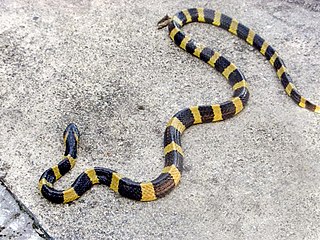
The banded krait is a species of elapid snake found on the Indian Subcontinent and in Southeast Asia. It is one of the largest kraits, with a maximum length up to 2.1 m.

The banded sand catshark is a catshark of the family Scyliorhinidae found in the Indo-West Pacific Ocean, endemic to northern Australia between latitudes 10° S and 21° S, at depths between 27 and 120 metres. Its length is up to 45 centimetres (18 in).

The striped smooth-hound is a houndshark of the family Triakidae, found on the continental shelves of the subtropical southwest Atlantic from southern Brazil to northern Argentina between latitudes 30° S and 47° S, from the surface to 250 m. It can grow up to a length of 1.77 m. The reproduction of this shark is Ovoviviparous, with the length at birth up to 39 cm.

The blacktip grouper or redbanded grouper, is a species of marine fish in the family Serranidae.
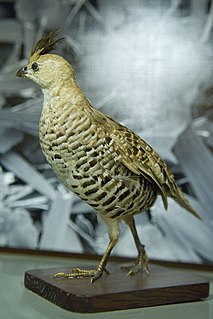
The banded quail is a species of bird in the family Odontophoridae. It is found only in Mexico where its natural habitats are subtropical or tropical dry forests, subtropical or tropical dry shrubland, subtropical or tropical high-altitude shrubland, and heavily degraded former forest.

The bar-breasted honeyeater is a species of bird in the family Meliphagidae. It is endemic to northern Australia, with a breeding season from late spring to winter. It feeds primarily on nectar and invertebrates.

Oncopeltus fasciatus, known as the large milkweed bug, is a medium-sized hemipteran of the family Lygaeidae. It is distributed throughout North America. It ranges from Central America through Mexico and the Caribbean to southern areas in Canada. Costa Rica represents this insect's southern limit. It inhabits disturbed areas, roadsides and open pastures. Due to this widespread geographic distribution, this insect exhibits varying life history trade-offs depending on the population location.
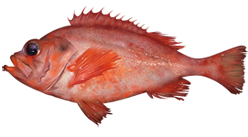
The Acadian redfish, also known as the Atlantic redfish, is a marine deep-water fish belonging to the family Sebastidae native to the northwestern Atlantic.
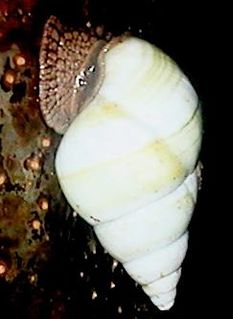
Liguus fasciatus, the Liguus Tree Snails, also known as "living jewels", is a species of air-breathing land snail, a tree snail, a terrestrial pulmonate gastropod mollusk in the family Orthalicidae.
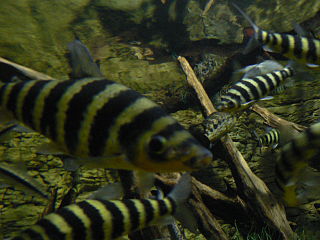
Leporinus fasciatus, commonly known as the banded leporinus or the black-banded leporinus, is a species of characin in the family Anostomidae. L. fasciatus is native to the Amazon Basin in South America, but has been introduced into the US states of Florida and Hawaii. It has not been observed from Hawaii as of 2005; the species is thought to have been extirpated in the region.
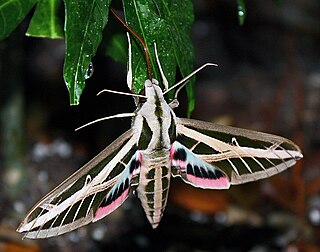
Eumorpha fasciatus, the banded sphinx moth, is a moth of the family Sphingidae. The species was first described by Johann Heinrich Sulzer in 1776.
Goshawk may refer to several species of birds of prey, mainly in the genus Accipiter:
Calliini is a tribe of longhorn beetles of the subfamily Lamiinae.
Hemicladus is a genus of longhorn beetles of the subfamily Lamiinae.
Hemicladus callipus is a species of beetle in the family Cerambycidae. It was described by Buquet in 1857. It is known from Brazil.
Hemicladus dejeanii is a species of beetle in the family Cerambycidae. It was described by Buquet in 1857. It is known from Brazil and French Guiana.
Hemicladus thomsonii is a species of beetle in the family Cerambycidae. It was described by Buquet in 1857. It is known from Brazil and Paraguay.
References
- ↑ BioLib.cz - Hemicladus fasciatus. Retrieved on 8 September 2014.
| This Calliini article is a stub. You can help Wikipedia by expanding it. |